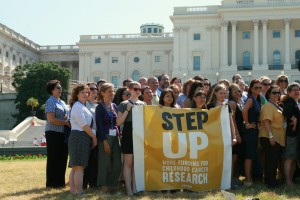September is Childhood Cancer Awareness Month a month dedicated to honoring youth who have battled cancer and highlighting the work that needs to be done to prevent and treat cancer, while improving the quality of life of patients and survivors. Through advocacy, ACS CAN is working to make sure children with cancer not only survive, but thrive.

Childhood cancer is the leading cause of death by disease for kids ages 5-14 in the U.S. It is estimated that more than 15,000 kids between the ages of 0 and 19 will be diagnosed with cancer this year. While researchers have made progress in treating many types of pediatric cancers over the past several decades, some types of childhood cancer remain deadly because of a lack of treatments. Importantly, two-thirds of childhood cancer survivors endure debilitating side effects from their cancer or its treatment, which can last throughout their lifetimes.
Congress has a significant role to play in addressing these critical areas of need. That's why ACS CAN is working with our partner groups to pass legislation that will aid in the development of new treatments and improve the quality of life for kids not only while they receive cancer treatments, but throughout the rest of their lives. I'm pleased to share that in early August, Reps. Michael McCaul (R-TX), Chris Van Hollen (D-MD) and Jackie Speier (D-CA), and Sens. Jack Reed (D-RI) and Shelley Moore Capito (R-WV) introduced the Childhood Cancer Survivorship, Treatment, Access and Research (STAR) Act (S. 1883/H.R. 3381).
This legislation expands child, adolescent and young adult cancer research, supports the development of innovative models of care to help improve survivors' care, improves cancer incidence tracking and identifies opportunities to expand the development of therapies for childhood cancer. The STAR Act, supported by the Alliance for Childhood Cancer, would help to tackle many of the issues the childhood cancer community faces today. With the bill's strong bipartisan support, I'm hopeful for swift and broad congressional support so we can pass this critical legislation.
Members of Congress will highlight the STAR Act, among other legislative issues to fight back against childhood cancer, during the Childhood Cancer Caucus Summit on September 18, an annual Capitol Hill event that shines light on childhood cancer issues. In addition to the STAR Act, there are two other pieces of ACS CAN-supported legislation that have been introduced on Capitol Hill that address childhood cancer.
The 21st Century Cures Act (H.R. 6), which passed the U.S. House in July, promotes advances in childhood diseases by fostering domestic and international research collaborations and provides financial incentives for companies to develop drugs specifically for cancers and other diseases experienced by children.
The Andrea Sloan CURES Act (H.R. 909) would make it easier for patients and their physicians to navigate drug companies' expanded access programs when pursuing access to experimental therapies outside of the clinical trial process for "compassionate use."
ACS CAN is also working to pass legislation that improves the quality of life for all people with cancer at any age and any stage as well as their families, through improved access to palliative care services. Palliative care can be especially important to childhood cancer survivors, as the vast majority of them endure life-altering and life-threatening symptoms, side effects and late effects resulting from aggressive treatment that can last their entire lives. For many children and their families, treating the pain, stress and other symptoms of cancer is as important as treating the disease. Consequently, pairing pediatric palliative care with anti-cancer therapies has emerged as the new model for optimal comprehensive care that focuses on the quality of life for the child and family as an essential aspect of managing the disease.
We have strong champions in Congress and advocates across the country who support these legislative initiatives because they know what a big difference they can make for any child fighting cancer, as well as his or her family. This Childhood Cancer Awareness Month, I challenge others to get involved and let their members of Congress know just how important this issue is for our nation's children.


